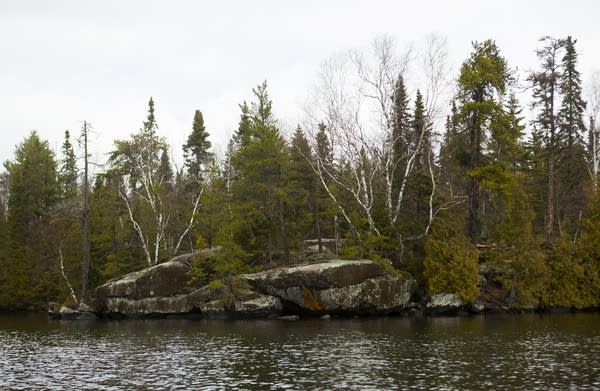Why proposed BWCA land swap roils some waters

Go Deeper.
Create an account or log in to save stories.
Like this?
Thanks for liking this story! We have added it to a list of your favorite stories.
More than three decades after the controversial deal that established the Boundary Waters Canoe Area in northern Minnesota, relatively small plots of land in the wilderness continue to generate big disputes.
Known as school trust lands, these plots were set aside to generate income for schools, primarily through logging or mining. This week, the U.S. Forest Service is holding meetings on the latest attempt to get access to those school trust lands by swapping some national forest land for state-owned land within the Boundary Waters.
The issue remains contentious. Here's a quick guide to the dispute, the history and what's at stake:
Turn Up Your Support
MPR News helps you turn down the noise and build shared understanding. Turn up your support for this public resource and keep trusted journalism accessible to all.
What's behind this controversy?
Back when Minnesota became a state, the federal government set aside two sections of land in each township to be used for the benefit of public schools. Since then, most of the land has been sold — except in northeast Minnesota, where there are still about 2.5 million acres.
About 83,000 acres of that land was locked up inside the Boundary Waters when the wilderness area was created in 1978. And the fight ever since has been over what to do with that land.
What are the U.S. Forest Service and the Minnesota DNR proposing?
They want to trade some land. The Forest Service would acquire about 30,000 acres of the state school trust land that's basically trapped within the Boundary Waters. The Minnesota DNR would obtain an equal value of land scattered throughout the Superior National Forest, outside the BWCA. The exact parcels haven't been identified yet.
Why is the DNR pushing for this trade?
The state wants to be able to manage school trust lands for revenue. Indeed, the state Constitution requires the DNR to manage them on behalf of the Permanent School Trust Fund.
But because the Boundary Waters is protected as wilderness, the state can't use the school trust lands inside for mining or logging, the activities that would generate the most money. By swapping some land, the state hopes to get land that could be developed.
What does the federal government want?
The feds support this because it would allow them to consolidate ownership of their land within the Boundary Waters. They don't want to have to deal with state inholdings in the BWCA. The deal could also simplify management of land outside the BWCA.
Why is the proposal controversial?
Conservation groups have long supported selling the school trust lands inside the BWCA to the feds. They don't want to shrink the size of the Superior National Forest outside the Boundary Waters. They worry about the mining and logging that might follow on the newly acquired land.
On the other side, Iron Range legislators and other state officials have long supported a land exchange rather than a sale. They argue that maintaining ownership of the land would return more revenue in the long term.
A few years ago, in a significant breakthrough, the two sides agreed to a hybrid plan. Roughly one-third of the land would be exchanged, and the rest sold to the federal government.
And is that still the plan?
It is. This proposal is a first step. It would allow the Forest Service to acquire 30,000 acres of school trust land in the BWCA through an exchange. But, that still leaves more than 50,000 acres.
Under the hybrid plan, that's supposed to be purchased by the federal government. But so far the Superior National Forest hasn't been able to get the feds to put up the cash — about $60 million.
Environmental organizations like the Friends of the Boundary Waters are concerned. They were part of the working group that hashed out the hybrid compromise. But they're now saying that they can't support this exchange if the purchase part of the plan is not included. They worry about pressure to do another exchange in the future.
What happens next?
The Forest Service is holding its next open house in Duluth on Thursday, and two more later this month. It will also hold meetings this month in St. Paul and Ely. The comments the agency receives will help determine the level of environmental analysis the proposal will require.



